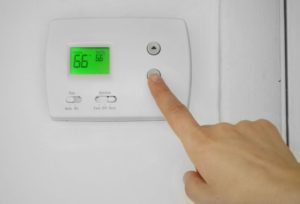During chilly fall and winter evenings, do you turn the thermostat up in your house? Perhaps you like to be very warm and cozy as you are drifting off to sleep. Or do you like your bedroom to be slightly on the cool side? While indoor temperature might seem like purely a matter of personal preference, it can actually have a bearing on your health. Specifically, it could affect your sleep apnea symptoms. Just how does temperature affect sleep apnea? This blog post explains.
Temperature and Sleep Quality
If you have ever slept in a hot room with no air conditioning, you probably remember an uncomfortable experience. You might have woken up several times throughout the night and felt exhausted the next morning.
Research has found that most humans sleep best when the ambient temperature is 60 – 67 degrees Fahrenheit. That might seem a little on the cool side, but it makes sense because when you drift off to sleep, your body temperature drops. If your surroundings are too hot, it can take more energy to get your body to its ideal sleeping temperature.
People with sleep apnea need to be especially aware of how temperature might affect their condition. Many people have found that when their room is too hot, their symptoms become worse. If you regularly sleep in a warm (or hot) bedroom, it may be wise to set your thermostat a little lower. You might be surprised by your results!
Keeping Your Bedroom Cool and Comfy
Here are some tips that may help you create a restful bedroom environment so you can get the highest-quality sleep possible:
- Use bedding that breathes. Sheets and blankets made out of linen, silk, or other breathable fibers are good for temperature regulation. A cooling mattress may also be helpful.
- Choose the right window coverings. Some curtains and drapes can reduce heat transfer through your windows, which can help to keep your bedroom temperature consistent throughout the night.
- Have a thorough cleaning routine. Dust, pet dander, and other allergens may worsen nighttime breathing problems.
- Consider using an oral appliance instead of a CPAP. Of course, your sleep apnea treatment is important. However, some people find that a CPAP machine is uncomfortable and noisy. An oral appliance from a dentist may be a better option.
Is your bedroom a good environment for sleep? Adjusting the temperature or making other small changes might help you manage your sleep apnea in the best way possible.
Meet the Practice
The three doctors in our practice are experienced sleep apnea dentists who are eager to help patients throughout Glendale, Scottsdale, and Mesa to enjoy all the benefits of high-quality rest. If you are struggling with sleep apnea and would like our guidance on how you can manage your condition, we are ready to assist you. Contact Go to Sleep’s Glendale location at 623-600-4215.

